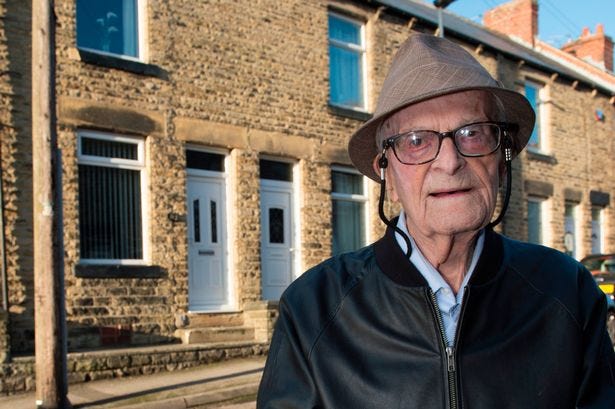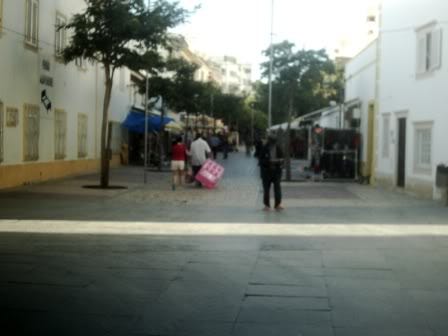June 2024 marks the 10th anniversary of the publication of Harry’s Last Stand. Considering that the world has become much shittier over the decade since my father’s book was published, you would expect to see a reprint of that work. But it is doubtful as the publisher told me last year, “the world has moved on from Harry.” Naturally the person who told me this went to Cambridge in the 1980s, whilst my dad left school at 14 in 1937 to do his part to keep the entitled wealthy through low wage labour. It is what it is.
But while the mainstream publishing world or news media won’t commemorate this book or the five other books, I will on here. In many ways I feel like a scribe in a monastery during the Dark Ages, trying to preserve the history of the ancient world in a time when the past was in danger of being forgotten.
Below is a small excerpt from Harry’s Last Stand. And remember if you can and only if you can, upgrade to a paid subscription because my rent in due Monday.
At first, life for me in Portugal went on as usual. I read my books, I watched the ocean. In the afternoons, I drank wine in cafés near the ocean, made new friends, read books or wrote in my journal. I thought that if this was how my life was to end, it wasn’t a bad note to go out on. But as the year progressed the financial news grew worse.
In Portugal the government and the people seemed blind to the inevitable: ‘There is no problem here in the Algarve. You Brits will always come and spend your money. Look, our cranes are still building condos, flats and timeshares. You should buy into one, because you can get a nice house for only 10 per cent down.’
On New Year’s Eve, the coastline was lit up by a fireworks display which cost over half a million euros that neither the regional nor national government could afford.
As I watched the festivities from my apartment balcony, I thought it looked more like an opulent distress flare rather than a celebration.
By February 2009 the good times were over for Portugal and most of the world. Coastal towns that had survived invasion, plague, wars, fascism and communism were now deserted of the commodity they needed most–tourists.
Restaurants in the city where I lived were empty, especially the ones near the beach. Waifs with menus in hand desperately tried to pressgang me and the few foreigners still left in the town to enjoy a full English breakfast for six euros.
In winter, between school holidays, there were few takers, and it seemed that even the stray cats had moved out of Albufeira in search of greener pastures. As fiscal markets dried up, the Telegraph portended another Great Depression for Britain if Brown remained as Prime Minister. People started talking about their ruined pension pots, their fear of redundancy. The only reason I didn’t was because I was struck by a personal tragedy that hit me with a ferocity that I had not known since boyhood.
My middle son, Peter, who had so stoically borne his mental illness, was diagnosed with idiopathic pulmonary fibrosis (IPF).
It is incurable and in quick time it turned his lungs into cement. I returned home to care for him. Within six months, he was in hospital attached to a breathing apparatus that pumped air into his foetid lungs through a hose that had been cut into his throat. My boy, who had just turned 50, told the doctors he could take no more.
His death approached like it had done for my sister in 1926 and my wife in 1999; it came like a thug in the night to torture him. He didn’t have an easy life, nor did his end provide him the tender mercy of an easy death.
(art work by Peter Smith, predicting his end a year before his death.)
Instead, my son had to beg wordlessly to be no more, because the disease had stolen his voice. When he died, grief came to sit and brood in my heart. I was spent with sorrow. After Peter was cremated, I returned to Portugal and hoped that I would soon join my wife and son in death.
Of course I didn’t, because life never works out as you want it, even when all you want is to leave it.
Instead of dying, I began a spiritual odyssey of sorts. Having spent years running away from my past, I started to seriously explore it and tried to unravel the anguish that my generation endured before the creation of the welfare state.
With the world around me collapsing, I came to the frightening realisation that the economic failure of 2008 was doing what the crash of 1929 had done to my generation.
Throughout the financial crisis, the government has reacted towards the banks like a co-dependent spouse when confronted by a weekend piss-up that caused a car wreck. It had taken a ‘lads will be lads’ attitude towards those who created the 2008 meltdown and the following recession, despite the disastrous impact they had on millions of lives.
Today, the dust still hasn’t cleared from that disaster, and most executives in the City and on Wall Street only mention it with as much circumspection as former SS officers once skirted their responsibility in the holocaust: ‘We were just following orders.’
It was crass, inhumane, and malicious of this government to show no mercy to the unemployed, the disabled and the disadvantaged during the financial crisis. That it continues to behave like a bully to those down on their luck makes me think that the government’s cruelty is deliberate.
They want to change society to reflect only the interest of our corporations and the 10 per cent of the population who profit inordinately from a system that chastises people, through lack of opportunity, for being poor or ordinary workers…
Hi All:
Thanks for reading my substack. You have been great all this year and my subscription numbers have grown. I do really need your help during this end of the year, if you are able. I am rent short and want to remained housed and continuing to sustain and grow the legacy of my dad and his Last Stand Project. I think it is worthwhile and necessary. I am looking for 16 new yearly subscribers to keep the lights on. It’s 30 quid a year or $50 and I think it has value. Substack and the payment platform take around 20% of that because capitalism is the gift that keeps giving to the wealthy. So if you can thanks and if you can’t it’s all good because you in solidarity with the work and projects ahead.
Take care, John







Thanks for reminding us all of the horrific consequences of Capitalism through your family’s story. Just as Marx predicted, the alienation by brutal competition has rendered any attempt of a humane society near impossible. The 1%, and the sycophantic enablers (20%), have stolen our energy in order to create worldwide destabilization and sociopathic behavior as the norm. I say near impossible because the majority of us are not blind to these machinations. Which is why they have given up on psychological programming, and have moved to straight up killing.